
Energy & Environmental Materials
Scope & Guideline
Leading the Charge in Sustainable Material Science
Introduction
Aims and Scopes
- Energy Storage Technologies:
The journal aims to explore advancements in energy storage systems, particularly lithium-ion batteries, sodium-ion batteries, and emerging technologies like solid-state batteries and supercapacitors. - Electrochemical Energy Conversion:
Research on materials and methods for efficient electrochemical processes, including fuel cells, electrocatalysis, and water splitting, is central to the journal's scope. - Sustainable Materials Development:
The journal emphasizes the development of environmentally friendly materials, including biodegradable polymers and materials derived from biomass for energy applications. - Nanomaterials and Nanotechnology:
Research focusing on nanostructured materials and their applications in energy and environmental technologies is a significant area of interest, highlighting their unique properties and functionalities. - Environmental Applications:
The journal covers innovative approaches to environmental remediation and pollutant detection, integrating materials science with environmental engineering. - Computational and Theoretical Studies:
The incorporation of computational methods for material design and optimization in energy and environmental applications is a key focus, facilitating the understanding of material properties and behaviors.
Trending and Emerging
- Solid-State Batteries:
There is a marked increase in research around solid-state battery technology, driven by the need for safer and more efficient energy storage solutions. - Biomass and Sustainable Materials:
Research focusing on the utilization of biomass and the development of sustainable materials is on the rise, highlighting the importance of eco-friendly approaches in energy applications. - Advanced Electrocatalysis:
Emerging studies on electrocatalysts for various reactions, including hydrogen evolution and CO2 reduction, indicate a growing interest in improving efficiency and sustainability in electrochemical processes. - Machine Learning in Materials Science:
The integration of machine learning techniques for the design and optimization of materials is becoming increasingly prominent, showcasing the potential for data-driven advancements in energy technologies. - Environmental Remediation Technologies:
An increase in research dedicated to innovative materials and methods for environmental remediation reflects the pressing need to address pollution and sustainability challenges.
Declining or Waning
- Conventional Battery Technologies:
Research on traditional battery technologies, particularly lead-acid batteries, appears to be declining as the field shifts towards more advanced and sustainable options like lithium-sulfur and sodium-ion batteries. - Low-Efficiency Renewable Energy Systems:
There is a noticeable reduction in studies focusing on older or less efficient renewable energy systems, as newer, more efficient technologies gain prominence in research. - Basic Material Characterization:
While foundational research remains important, there is a growing preference for applied studies that demonstrate practical applications of materials rather than purely theoretical or characterization-focused papers. - Heavy Metal Catalysis:
Research specifically focused on heavy metal catalysts for energy applications is diminishing, likely due to increasing environmental regulations and a shift towards more sustainable alternatives.
Similar Journals
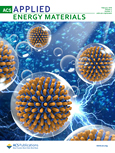
ACS Applied Energy Materials
Innovating the Future of Energy through ResearchACS Applied Energy Materials, published by the American Chemical Society, is a premier journal dedicated to the cutting-edge fields of energy materials, chemical engineering, and electrochemistry. With an impressive impact factor and consistently ranked in the Q1 category across multiple disciplines—including Chemical Engineering, Electrical and Electronic Engineering, and Materials Chemistry—this journal serves as a pivotal platform for researchers and professionals focused on innovative solutions for energy systems and materials science. Since its inception in 2018, ACS Applied Energy Materials has been committed to disseminating high-quality research that addresses pressing energy challenges, promoting sustainability and efficiency in various applications. Its competitive Scopus rankings reflect the journal's influence and relevance within the academic community, making it an essential resource for anyone looking to stay at the forefront of energy materials research.
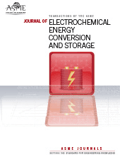
Journal of Electrochemical Energy Conversion and Storage
Innovating Electrochemical FrontiersThe Journal of Electrochemical Energy Conversion and Storage, published by ASME, is a premier platform for cutting-edge research in the fields of electrochemistry, energy engineering, and materials science. With an ISSN of 2381-6872 and an E-ISSN of 2381-6910, this journal aims to disseminate high-quality articles that contribute to the understanding and application of energy conversion and storage technologies. Notably recognized in the 2023 Category Quartiles as Q2 in multiple categories including Electronic, Optical and Magnetic Materials, Energy Engineering and Power Technology, and Mechanical Engineering, it reflects a strong academic impact within its field. The journal also boasts competitive Scopus rankings, highlighting its relevance and influence across disciplines. Operating under an open access model, the journal ensures that research findings are widely accessible, fostering collaboration and innovation among researchers, professionals, and students globally. As we move toward a more sustainable future, the Journal of Electrochemical Energy Conversion and Storage plays a critical role in advancing technologies that promise to reshape how we harness and utilize energy.
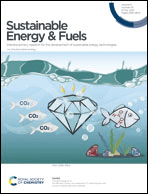
Sustainable Energy & Fuels
Transforming Energy Engineering for Global SustainabilitySustainable Energy & Fuels is a leading journal published by the Royal Society of Chemistry, dedicated to advancing knowledge in the fields of energy engineering, fuel technology, and renewable energy solutions. With its ISSN of 2398-4902 and notable Q1 status in both Energy Engineering and Power Technology as well as Fuel Technology, this journal ranks impressively in the Scopus database, ensuring a strong platform for disseminating impactful research. The journal spans a comprehensive scope aimed at addressing the global challenges of sustainable energy, including innovative methodologies and technologies that promote environmental sustainability. Although it operates under a traditional access model, the journal is committed to providing high-quality content that engages researchers, professionals, and students alike. With significant contributions expected through 2024, Sustainable Energy & Fuels stands at the forefront of facilitating scholarly communication, inspiring advancements in energy technologies that align with sustainability goals.

ACTA CHIMICA SINICA
Advancing the Frontiers of Chemical KnowledgeACTA CHIMICA SINICA, published by SCIENCE PRESS, is a distinguished peer-reviewed journal in the realm of Chemistry, specifically focusing on general and miscellaneous chemistry fields. Since its inception in 1982, the journal has consistently contributed to the advancement of chemical research in China and beyond, maintaining a reputable standing within the academic community, evidenced by its 2023 Scopus ranking of #197 out of 408 in its category. With a current impact factor placing it in the Q3 quartile, ACTA CHIMICA SINICA aims to disseminate innovative research findings, covering a wide spectrum of topics within the discipline. Although it is not an open-access journal, it offers various access options through institutional subscriptions, ensuring that its high-quality content is available to a broad audience. Researchers, professionals, and students alike will find this journal a vital resource for keeping abreast of developments in the field and for contributing their own findings to an engaged scientific community.

Advanced Energy and Sustainability Research
Driving Change through Open Access ResearchAdvanced Energy and Sustainability Research is a leading open-access journal published by WILEY since 2020, dedicated to advancing knowledge and understanding in the realms of energy and sustainability. With an impressive impact factor and a commitment to high-quality, peer-reviewed research, this journal serves an international audience of researchers, professionals, and students passionate about addressing critical environmental challenges. The journal encompasses a wide array of topics within environmental science and energy fields, securing notable rankings in Scopus with top percentiles across several categories, including Ecology, Energy Engineering and Power Technology, and Waste Management. Given its open-access model, Advanced Energy and Sustainability Research facilitates the dissemination of cutting-edge research, enhancing accessibility and fostering collaboration within the scientific community. This journal not only plays a pivotal role in shaping public policy and industry practices but also aims to inspire innovative solutions for sustainable development in an increasingly complex world.

Electrochemical Energy Reviews
Advancing Sustainable Solutions Through ElectrochemistryElectrochemical Energy Reviews, published by SpringerNature, serves as an essential platform for the dissemination of cutting-edge research in the fields of electrochemistry, material science, and energy engineering. With an impressive impact factor and ranked in the Q1 category across multiple disciplines including Chemical Engineering and Energy Technology, this journal highlights its commitment to advancing knowledge and innovation within the energy sector. Operating since 2018, the journal not only provides a valuable resource for researchers and professionals but also invites contributions from students and emerging scholars interested in the pivotal role of electrochemical processes in sustainable energy solutions. Published in Germany and widely accessible to the global research community, Electrochemical Energy Reviews is an indispensable reference for those keen on exploring the future of energy technologies.

Materials Today Sustainability
Empowering research to drive eco-friendly innovations.Materials Today Sustainability is a leading journal in the interdisciplinary field of sustainable materials, published by ELSEVIER. With a strong commitment to advancing knowledge in sustainability and materials science, this journal encompasses a broad range of topics, including renewable energy innovations, sustainable engineering, and eco-friendly materials development. Achieving a prestigious Q1 ranking in 2023 across Chemistry (Miscellaneous), Materials Science (Miscellaneous), and Renewable Energy, this journal plays a crucial role in disseminating high-impact research that addresses global sustainability challenges. With an impressive Scopus ranking that positions it among the top journals in Chemistry, Materials Science, and Renewable Energy, Materials Today Sustainability is an invaluable resource for researchers, professionals, and students dedicated to driving forward the agenda of sustainability and material innovation. The journal is accessible through a robust open access model, ensuring the research reaches a global audience, facilitating collaboration and innovation in this critical field.
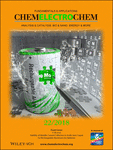
ChemElectroChem
Unlocking innovative solutions for a sustainable future.ChemElectroChem is a premier open-access journal published by WILEY-V C H VERLAG GMBH, focusing on the interdisciplinary fields of catalysis and electrochemistry. Established in 2014 and actively publishing until 2024, this journal boasts an impressive reputation, currently ranked in the Q2 category for both catalysis and electrochemistry according to the 2023 metrics. With an Scopus ranking placing it in the 74th percentile for Electrochemistry and 61st for Chemical Engineering and Catalysis, ChemElectroChem serves as an essential platform for researchers, professionals, and students dedicated to advancing knowledge and fostering innovation in these critical scientific domains. Since its transition to open access in 2023, the journal aims to maximize the dissemination of cutting-edge research and facilitate the exchange of ideas among global scholars, thereby enhancing the accessibility and impact of high-quality science within the community. For those engaged in the ever-evolving conversations around energy storage, conversion processes, and sustainable solutions, ChemElectroChem is an invaluable resource.
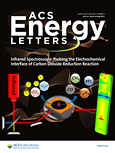
ACS Energy Letters
Exploring Cutting-Edge Research in Energy ScienceACS Energy Letters, published by the American Chemical Society, is a prestigious peer-reviewed journal designed to disseminate innovative and impactful research in the multifaceted field of energy science. Since its inception in 2016, the journal has quickly ascended to a remarkable status, achieving Q1 rankings in critical categories including Chemistry (miscellaneous), Energy Engineering and Power Technology, Fuel Technology, Materials Chemistry, and Renewable Energy, Sustainability and the Environment as of 2023. With an emphasis on rigorous research methodologies and interdisciplinary collaboration, ACS Energy Letters serves as a vital platform for scholars, professionals, and students to explore cutting-edge research that addresses contemporary energy challenges. While maintaining a commitment to advancing knowledge without open access, it offers profound insights into sustainable practices and innovative solutions that are crucial for the future of energy systems globally. The journal's esteemed standing in the chemical and energy sectors underscores its significance, making it an essential resource for anyone invested in the advancement of energy technologies and sustainable practices.

EcoMat
Unleashing the potential of materials for a greener planet.EcoMat, published by WILEY, stands as a cornerstone in the interdisciplinary fields of Chemistry and Materials Science. Since its inception in 2019, this Open Access journal has quickly garnered a prestigious reputation, achieving Q1 category rankings across various fields, including miscellaneous chemistry and physical and theoretical chemistry. With Scopus rankings reflecting its impact—ranked #7 in both Physical and Theoretical Chemistry and Chemistry (miscellaneous)—EcoMat publishes cutting-edge research that addresses critical challenges in material sustainability and innovation. Researchers, professionals, and students alike benefit from the rich content accessible from its Hoboken, NJ location, exemplifying a commitment to enhancing scholarly communication and collaboration whilst advancing the frontiers of material sciences and chemistry.